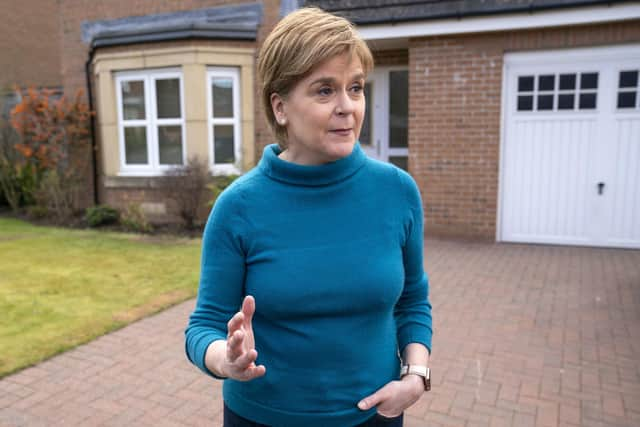Why the SNP must find answers on party finances and put conspiracy theories to bed - Brian Monteith
Despite the many febrile and inventive minds at work on social media, the more prosaic answer is likely to be a combination of police protocols about the gathering of documentary evidence and using the tent structures to provide a degree of privacy to the police conducting the operation. After all, both Mr & Mrs Murrell had voluntarily left the scene earlier. The largest tent simply covered the police van where any evidence might be placed.
Part of the shock was in response to the scale of the police footprint in what has, after all, been a very slow-moving inquiry into the whereabouts of what was originally a 2017 restricted fund for campaigning that grew to over £600,000 but was no longer visible in the SNP’s accounts of 2019. It is not now for this column to speculate on the whereabouts or uses of the fund – we can leave it to the police forensic accountants to provide that information to the Crown Office in good time so that the Procurators Fiscal can decide if there is a case to answer.
Advertisement
Hide AdAdvertisement
Hide AdWhat I do think is worth recording, however, is that if it is decided there is not enough evidence to sustain a prosecution then it is in everyone’s interests – including that of the SNP itself – for that party to give an open and public explanation of what indeed happened to the funds donated with goodwill and public-spirited intentions. Only if full transparency is recorded and made available can any stain on our wider Scottish democracy be removed.


Be under no illusions, any party’s financial scandal infects donations to other parties too and the sullies the reputation of all politicians in the wider public’s consciousness.
It is especially in the interests of the new First Minister, Humza Yousaf – whose election was built on the foundational claim he was the continuity candidate of the former SNP leadership team of ex-Chief Executive, Peter Murrell, and retired First Minister, Nicola Sturgeon – to be able to demonstrate he and his regime are innocent of anything that may transpire.
The conspiracy theories need to be put to bed and it is the First Minister who will be best placed to do that. He must be utterly open.
It would be a great tragedy for Scotland that if, after wasting the last nine years chasing a second independence referendum and thereby neglecting the crises faced by our public services, the SNP spends the next three years until the 2026 Holyrood election in firefighting speculation about who decided what, who knew what and if their conduct was in the public interest.
While currently there are more questions than answers surrounding the SNP restricted campaign fund – and the police investigation requires the space, time and confidentiality to protect the innocent from reputational damage – what is of public interest and can surely be considered distinctly and separately from formal police investigations is why public and political discussion on the matter was silenced when those tasked in the party of scrutinising the accounts were resigning and complaints had been made to the police?
It should be remembered that it has been the role of the Scottish media in investigating the SNP’s published accounts and reporting the strange absence of the “frozen” restricted fund being listed previously up until 2018 – but not thereafter – that initially raised public interest. On his 2021 resignation Douglas Chapman stated, “I have not received the support, or financial information to carry out the fiduciary duties of National Treasurer”.
How did the SNP manage to gloss over these public concerns on internal finances that merited the obvious question – is the SNP a fit and proper organisation to be running the country? Was it another case of “Wheesht for indy”? by those in the party?
Advertisement
Hide AdAdvertisement
Hide AdThe Party President, Michael Russell, has claimed he sought answers over the restricted fund and the Deputy Leader, Keith Brown, sought to have the matter opened up at least internally but both apparently failed.
Russell and Brown were both Ministers presumably on speed-dial to the Party Leader and First Minister – was she not concerned enough or able to intervene?
Was the fact that she and the SNP Chief Executive were and still are married an impediment to transparency? Was there a conflict of interest?
And what really did that mean for Scotland's democracy when – as we have now seen – that following Nicola Sturgeon’s resignation and return to the backbenches the choice of First Minister was left not to the electorate but to members of the party? Those same members of the party who had not been given the respect of receiving a full explanation of what had happened to the restricted campaign funds that ultimately merited a police investigation?
Parties are expected to be open and transparent about their funding – that is why they must report to the Electoral Commission and not just Companies House or meet recognised an proper accounting standards. In advance of elections the public has a right to know that parties are solvent and not in receipt of funding from outside the country.
It is only right that questions are not just levelled at those in charge of the finances – but are asked now of those that shielded any scrutiny to save themselves and their party from political embarrassment.